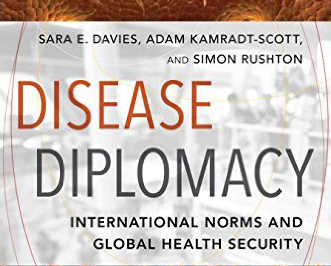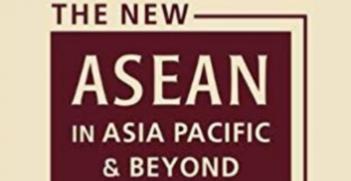Disease Diplomacy: International Norms and Global Health Security

The fact that infectious disease outbreaks have more reach in our increasingly globalised world is not very contentious. However, up until the early 2000s, global health security was not a seen as a priority by most states. It took a serious public health emergency to jolt the management of disease outbreaks up to an international priority. This renewed focus culminated in the 2005 revision of the International Health Regulations (IHR), heralded as a much-required update of an out-dated legal instrument, which arguably resulted in a significant shift in international health norms. The authors of Disease Diplomacy examine the process that led to the revision of global health regulations and the emergence of new international norms.
The authors focus on the international political processes that were required to amend the global heath regulations rather than examining the subject from purely an international law or public health perspective. Finnemore and Sikkink’s Norm Life Cycle theory is utilised as the conceptual framework for the book and is used to evaluate new emerging norms.
The authors then use a series of case studies to demonstrate how the norms of reporting and responding to global pandemics have evolved. The SARS outbreak and the 2001 anthrax letters security threat are pinpointed as the tipping-point for IHR revision. The authors argue that the global community requires a concrete threat to demonstrate the potential destructiveness of disease outbreaks or bio-weapons to the national health and security of sovereign nations.
Interestingly, the authors conclude that generally, the biggest obstacle for the current non-reporting by developing countries is the lack of infrastructure; the intent is often not malicious. Prior to the 2005 revision, many countries used to refuse to divulge details of disease outbreaks frequently to prevent reactionary trade and travel restrictions from other states. Now, the global community mostly looks at this type of behaviour poorly, which reflects a positive development of global public health norms.
The authors explain the complex process of reforming international regulations and shed light on how important norm institutionalisation is for the implementation and enforcement of World Health Organisation (WHO) regulations. The book concludes that the continuously changing nature of global disease requires necessary infrastructure to be put into place and that the reputation of the WHO is vital to ensure the continued compliance to the current rules.
The release of the book is well-timed as there is a mainstream interest in disease outbreak management that largely stems from the recent Ebola outbreak in West Africa and then subsequent cases in western countries. The normative focus of this book is very narrow, which does leave room for research extension. However, the authors give a very interesting account of the institutionalisation of global norms and the structure of the book is well thought-out. The book makes a significant contribution to a developing field of research and will be a valuable resource to both students and scholars.
Sara E. Davies, Adam Kamradt-Scott and Simon Rushton, Disease Diplomacy: International Norms and Global Health Security, John Hopkins University Press, 2015
Reviewed by Simone Hilary Burke, former intern at the National Office of the AIIA. This article can be republished with attribution under a Creative Commons Licence.





